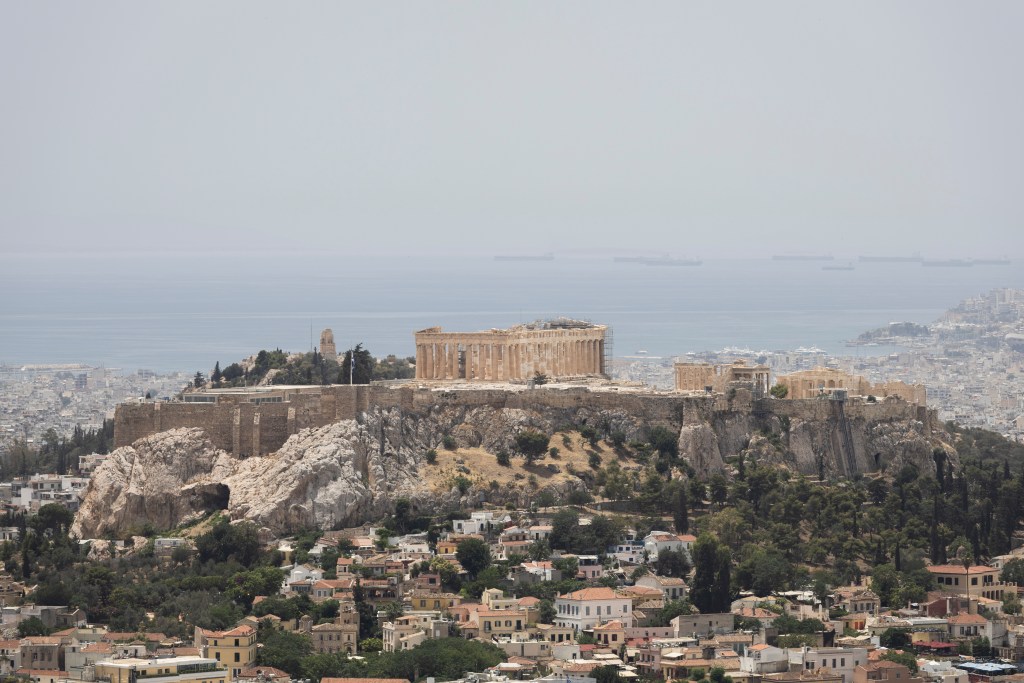Killer heat hits Europe, Middle East and Asia, amid fears for the Olympics


Extreme heat is behind the deaths of a number of tourists visiting Greece. Photo: Getty
A summer heatwave that has killed five people in Greece, including famed TV doctor Michael Mosley, is sparking warnings of an alarming weather pattern.
Mosley’s body was found near Agia Marina beach on the island of Symi on June 9.
The broadcaster and healthy living advocate is believed to have died of natural causes, just metres from help, after going missing while walking across the tourist island in scorching temperatures.
Since then, four other tourists have died in Greece and others are missing as temperatures soar, according to media reports.
Two men, an 80-year-old who went for a walk and a 70-year-old man who collapsed on a beach, died on Crete.
A 55-year-old man from the US died while out on a walk on Mathraki, a small island to the west of Corfu.
A 74-year-old Dutch man’s body was found on Samos off the Turkish coast, after he went for a walk.

A picture of Mosley was shared on a local Facebook group to appeal for any sightings.
A police spokesperson in Southern Aegean said there was a “common pattern” with recent deaths.
“They all went for a hike amid high temperatures,” Petros Vassilakis told Reuters.
According to local media reports, some of the victims went out after eating and drinking alcohol, others had no map or smartphone, or were in inaccessible terrain with no signal.
“Many tourists underestimate the effort associated with a walk in direct sunlight,” Athens cardiologist Thomas Giannoulis said.
“The temperature can rise to 37°C in the shade and easily up to 60°C in the sun.”

Greece has closed many of its historical sites due to the heat. Photo: Getty
Extreme heat widespread
Earlier this month, ancient tourist sites in Athens were closed due to the heat, while elderly Greeks took refuge at designated air-conditioned spots.
In nearby Cyprus, at least two people have died when the temperature went above 40°C.
Last Friday, parts of Cyprus were 10°C above the average for this time of year, reaching 45°C. It was the island nation’s hottest June day on record.
Meanwhile, neighbouring Turkey is battling temperatures above 40°C degrees, and fires near the Gallipoli peninsula.
Hundreds of Muslim pilgrims have reportedly died amid temperatures above 51 degrees as they journey to Saudi Arabia for the hajj at the Grand Mosque in Mecca.
Egyptian medical and security sources told Reuters on Thursday that at least 530 Egyptians had died while participating.
The Indian capital of New Delhi has recorded 38 consecutive days with a maximum temperatures at or above 40 degrees.
An official at the Indian health ministry said this week that there were more than 40,000 suspected heat stroke cases and at least 110 confirmed deaths between March 1 and June 18.
According to Euro News, Rome, Naples and Florence are expected to hit temperatures of about 39-40°C this weekend, while parts of Sardinia and Sicily could top 44°C.
There was a similar heatwave across much of Europe, including Greece, last northern summer. There were also record temperatures in Asia and the US.
Back then, Associate Professor Sarah Perkins-Kirkpatrick from UNSW Canberra told TND that while the weather was not normal, we shouldn’t be surprised.
“This is definitely not the worst to come, it’s probably only a taste of it to be precise,” she said.
Source: University of Portsmouth
‘Rings of Fire’
A recent report raised concerns that next month’s Paris Olympics could be the hottest on record – and warned it would be wrong to dismiss the potential disruption of a heatwave during the Olympics.
It’s not just the health of athletes and Olympic officials the report was concerned about, but also the spectators.
The Rings of Fire report, produced by climate scientists and leading heat physiologists Professor Mike Tipton and Dr Jo Corbett from the University of Portsmouth, warned that a 2003 heatwave in France killed more than 14,000 people.
“Climate change from human activities doubled the likelihood of that heatwave and increased the risk of heat-related mortality in central Paris by 70 per cent,” the report said.
“At the time, the maximum temperature recorded in Paris was 39.5°C . Extremely hot summers similar to 2003 are now 10 times more likely to occur because of climate change.”








